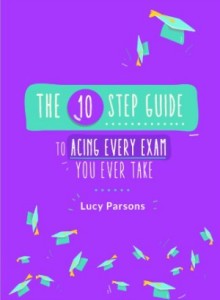The final countdown: How to spend the last 24 hours before an exam
As you approach the day of your first exam, your mind starts to turn to the final preparations. Maybe you're panicking because you still haven't been able to make yourself sit down and get on with your revision. Maybe you're feeling quietly confident because you've been putting in the work for weeks now – you just don't want to mess it all up in the last day or so.
I was asked the following questions by some of my readers:
‘How should I be revising the night before my exam?'
‘How do I remain calm (on the day of my real exam) when everyone around me is panicking and feeling scared?'
They're wise questions. Here, I'm going to explain to you the best way to spend those precious last 24 hours before your exam. I've got you covered whether over the last few weeks you've been
- A hard working planner, or,
- A procrasinator.
The hard-working planner's guide to the last 24 hours before your exam
If you've been working steadily through a well planned revision timetable for the past 4-6 weeks (or even longer) you enter the last 24 hours before your exam in a wonderful position. All that steady work you've been doing will mean that lots of information is firmly planted in your head, ready to rise to the surface as and when you need it in your exam. You'll be a whizz at past exam papers and you'll be quietly confident that you're ready to show off your hard work to the world.
The day before
During the day time, the day before your exam, you should carry on with your revision plan, school timetable or taking exams as already planned out. Try to emphasise revising for the exam the following day, but if you're in the middle of exam season with lots of exams still to take, it's probably not a good idea to exclusively focus on just the exam you've got tomorrow.
Just keep going at the revision, steadily and surely making progress.
The night before
For you, the night before should be all about rest and relaxation. You might want to cast your eye gently over your revision notes or get someone to test you on something for one last time. However, hard-core brain work should not be your emphasis. Here are some of the things that you should be doing:
- Double checking you have all your equipment for tomorrow's exam ready to go in the morning
- Having a nutritious and healthy meal
- Taking some exercise or getting some fresh air
- Relaxing in your favourite way, whether that's watching TV or having a bubble bath and painting your toe nails
- Getting an early night and a fantastic night's sleep
Being relaxed and well rested with your blood heartily circulating around your body is the healthiest way to prepare. It will mean that in the morning your mind is sharp, ready to dredge up everything you've revised, and nimble enough to make the most of what you know, even if you can't give the perfect answer to the question in front of you.
The morning of the exam
On the morning of the exam its all about being organised and prepared. Follow some of these simple steps to make sure you arrive at your exam calm and confident.
- Set an alarm and have a back-up alarm (whether that's another alarm clock or a person willing to make sure you're up).
- Eat a filling and nutritious breakfast.
- Double-check you've got everything you need for the day.
- Have a back-up plan for how you're going to get to the exam, just in case your normal transport plan goes pear-shaped.
- Stay calm and focused. Use deep breathing and don't let other people's nervousness and insecurity get to you. Don't talk about the exam or how much revision you've done to your friends, it won't help your chances of success or your friendship.
If you follow these tips you'll enter the exam hall feeling calm, confident and ready to go.

Eating a healthy and filling breakfast before your exam will keep your brain nourished and your stomach full – no growling gremlins half way through the exam or dips in blood sugar levels
The revision proscrastinator's guide to the last 24 hours before your exam
Are you one of those people who have spent the last 4-6 weeks whipping yourself up into a panic about the exams but not actually setting to work and getting some revision done? Or, have you just been burying your head in the sand and denying that your exams will ever happen? Yes? Then this is for you.
The day before
If you're not otherwise busy with school or another exam, start NOW!
Start what?
Your revision!
There is no longer time for faffing, time-wasting, procrastinating, worrying, denying or whatever it is you've been doing for the last X weeks. This is the time to step up to the plate.
With so little time left to go, there's no way you'll be able to cover everything. However, there are ways in which you can make this time count for more.
- Pinpoint the areas of the syllabus that are easiest for you to get up to standard and focus on them.
- Use active revision techniques. This means, don't just read the information through. This is passive and is the best way to fail to remember information. Instead, speak the information out loud as you read it, cover it over and try to repeat it back to yourself.
- For areas that you don't understand at all, try to find an alternative resource to work from. This could be a different text book, a website or a YouTube video. Choose the way of learning that will suit you best.
The night before
Carry on with the revision you haven't done in the last X weeks. (Am I making you feel bad for leaving it this late? Well, that's probably for the best as hopefully you won't be so silly again…)
The other things you should do are:
- Eat a healthy and nutritious meal
- Try to get a good night's sleep
Having a good night's sleep is crucial to helping your brain work it's best. And, when you're poorly prepared, your biggest asset will be a high-performing, sleep-powered brain.

Eating healthily before an exam will help your brain to work at it's best and keep you full up for longer so you don't get a sugar low in the exam.
The morning of the exam
- Make sure you get up in plenty of time.
- Do a couple of very short sessions (about 10 minutes each) of high-intensity active revision. This could be reminding yourself of the definitions of keywords or vocabulary words, or remembering quotes for an English exam.
- Eat a filling and nutritious breakfast.
- Double-check you've got everything you need for the day.
- Have a back-up plan for how you're going to get to the exam, just in case your normal transport plan goes pear-shaped.
- Stay calm and focused. Don't talk about the exam or how much revision you've done to your friends, it won't help your chances of success or your friendship.
 Want to know more?
Want to know more?
These strategies are taken from ‘The Ten Step Guide to Acing Every Exam You Ever Take‘. If you need more advice on how to get the most out of your exam preparation, as well as how to stay focused and perform your best in the exam hall itself, get your copy today.
Over to you
Which camp do you fall into? The planner or the procrastinator? Leave a comment below telling me how you're going to spend the last 24 hours before your exams.

